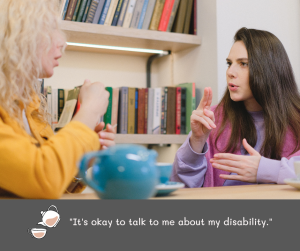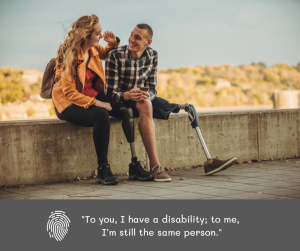For Disability Awareness Sunday, which takes place on 17 September, the United Reformed Church (URC) Disability Awareness Task Group highlights some of the things that disabled would like others to know about disability.
During the summer, the task group carried out a survey and shared some of the responses in July for Disability Pride Month.
There were so many insightful responses that more is being shared here and on the URC’s national social media channels in the lead up to Disability Awareness Sunday.
The awareness day provides us with opportunities to:
- Celebrate the ways we are all made in God’s image, whether we are disabled or able-bodied;
- Develop our awareness of the contributions disabled people can make to the Church and the awareness of the challenges faced in the church and beyond;
- Resolve to make this world more just and accessible for all.
What do disabled people want others to know about disability?
“It’s okay to talk to me about my disability.”
Often it seems that as a society we are uncomfortable talking to people about their disabilities.

One person offers a reassurance that: “It’s OK to talk about disability, even epilepsy. It’s even OK to talk about my epilepsy, but almost nobody ever does.
“I think a simple question could be, ‘How’s your epilepsy now?’ If people find mentioning it difficult but want to express their concern or interest, it’s worth admitting that they don’t want to be insensitive before asking their question. Or they could ask if it’s OK to ask about my epilepsy. Maybe followed by ‘What effect does it have on you or your life?’ or ‘How do you cope with it on your own?’
“I can’t think of any question I would object to unless it involved a put-down. It’s as if having epilepsy is a stigma, something not talked about in ‘nice’ company. I have been a member of the URC for more than 30 years and only two people have spoken to me about my epilepsy – one was my minister when he was new and he asked what to do if I have a fit, the other was a friend at church who is a doctor and he once asked how my epilepsy is now. I sometimes mention it, but nobody else does.”
Many disabled people have an experience of being treated as if they have no voice when able-bodied people address their companions or carers instead of them.
“People need to be aware that having a disability does not mean that we have lost the ability to speak for ourselves.”
“To you I have a disability; to me, I’m still the same person.”
Although disability impacts many aspects of our daily lives, disabled people do not want to be defined solely by their disability.
“My stroke has affected my ability to walk but I still love to talk, not about my struggles, but yours! Ask questions and I’ll answer but I just want to be me.”

It is important to talk to people about the support they need and to ask before offering help, remembering that a sense of agency and independence is important to all people regardless of ability or disability.
“All I want is to be treated the same way I was before. Now, people will insist on doing things they believe are helping me but are not asked for and not wanted.”
When others assume that they know what disabled people need and want, without involving them in the conversation, it can leave us feeling disempowered and isolated.
“I’m no longer asked to do readings in church. Do you think my wobbly walking has stopped me reading and understanding the scriptures? No, it’s getting into the church and platform that’s stopping me. I resigned from Eldership; no one asked me why. I was a pastoral Elder and I can still help others and do this by telephone.”
The Disability Task Group explains that people need to recognise that disabled people are every bit as essential to the body of Christ as able-bodied people.
“[Disability] hasn’t changed who I am. I can still be a full-time CRCW minister, I just arrange my week depending on my energy and pain. I am not a suffering/wounded servant. I don’t feel sorry for myself, and I don’t want pity,” says another person.
This Disability Awareness Sunday, why not consider how you can celebrate the contributions of everyone, no matter whether they are disabled or able-bodied, and explore how you can make church and your wider community more accessible to everyone.
The Disability Task Group offers this prayer:
Living God
we come with our mixture of abilities
and our limited understanding.
You know how people can be prevented
from reaching their potential
– by expectations of what is ‘normal’,
– by the environment not being adapted to their needs,
– or by being isolated from support and encouragement.
Help us value each other as you value us.
Help us overcome isolation and prejudice
to belong to your community of hope.
In Jesus, we see you being limited by others reactions
yet bringing life in all its fulness.
In the risen Jesus, we see the marks of pain and anguish
but recognise love reaching beyond them.
Help us to know how precious we are to you.
Help us offer ourselves as signs of your love at work in the world.
Through your Spirit that connects and equips us,
Amen.
The URC Disability Awareness Task Group is a group of disabled and able-bodied people from across the United Reformed Church who are creating disability awareness resources which will be available for churches through the URC Learning Hub.
To learn more about the Disability Task Group, or find more information and how you can get involved, please email disabilityawareness@urcscotland.org.uk.
